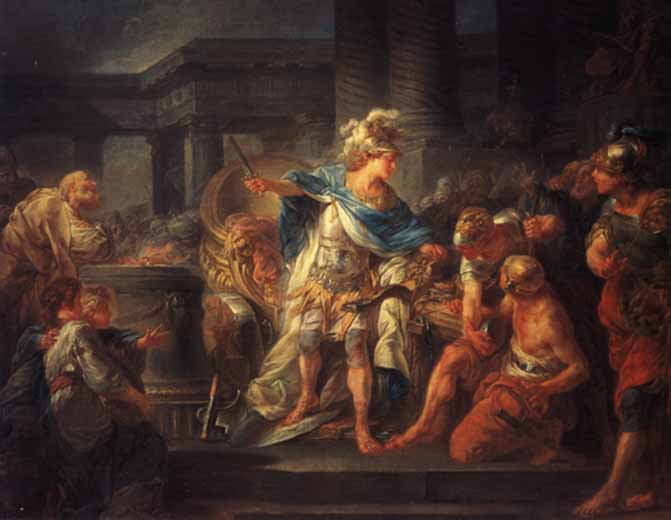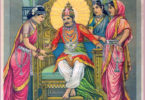Midas was king of Phrygia. He was the son of Gordius, a poor countryman. The previous king of Phrygia had died and the Oracle had prophesied that their future king would come in a wagon on the break of the day. People were still discussing what the Oracle had said when Gordius, with his son and wife, came driving his wagon through the gates of the city.
Gordius was made the king. His son Midas, to show their gratitude, dedicated their wagon to the deity of the Oracle and tied it up in its place with an intricate fast knot which became famous as the Gordian knot. It was said that whosoever would untie this knot would become the lord of whole Asia. No one succeeded in untying this knot, till Alexander the Great came to Phrygia in 333 BC. He tried to unravel the knot like many others before him but despite his efforts, he could not untie the knot. Growing impatient, he drew out his sword and cut the knot. When afterward he became successful in conquering Asia people began to think he had complied with the terms of the Oracle. Maybe by ‘untying’, the oracle had meant ‘cutting’.
‘Cutting the Gordian knot’ has now become a metaphor for a complex and inflexible problem solved by cheating or thinking creatively.
Midas ascended the throne after his father.
Once Bacchus, the God of wine, found his schoolmaster and foster-father, Silenus, missing. Silenus had been drinking and had wandered away in his intoxicated state. Some peasants found the inebriated Silenus drifting and brought him to their king Midas. Midas recognized him and made him his guest and treated him respectfully. This pleased Bacchus and he offered to reward Midas. He told Midas to ask for anything he wished. Midas loved riches, gold. Midas asked that whatever he might touch should be changed into gold. Bacchus granted the boon, though he knew it was a bad choice. Maybe he wanted Midas to experience the consequences of greed.
Midas was in the seventh heaven when he tested his newly found power and found it worked. He picked up a stone and it turned into gold. He touched a table and it turned into gold. He reached his palace. He ran around touching the walls, furniture of his palace and everything turned into gold. Elated, he sat down for a sumptuous meal. But to his dismay, the foods, drinks he touched also turned into gold. Starvation seemed to be his fate. When he hugged his daughter, she too turned into a statue of gold. His boon had become his bane. So the story of King Midas is not about him but about greed.
He prayed to Bacchus to relieve him from this glittering nightmare. Bacchus was merciful and kind and seeing that Midas had learned his lesson, he told him to go to the fountain-head of the River Pactolus and plunge into it to wash away his greed and its punishment. Midas took his dip and his gold creating power passed into the waters of the river.
The river sand became golden and golden it remains even today.
Midas’ experience had changed him. He gave up his wealth and splendor and started living in the country. He became a worshipper of Pan, the god of fields. Pan once dared to compare his music with that of Apollo, the God of music. He had the audacity to challenge Apollo to a contest. King Midas and Tmolus, the mountain god, were chosen to be the judges. One would be justified in thinking that after his experience with the golden touch King Midas would have become more sensible and wary of gods. But not our Midas, soon his judgment would land him again in soup.
Pan was the first one to play. He blew on his pipes, was good but not that good. Faithful Midas though not an expert, found Pan’s music very satisfying. Then came Apollo’s turn. His lyre charmed everyone. Tmolus declared Apollo the winner but Midas disagreed. Apollo was surprised that human ears could be so depraved. He said sarcastically that Midas had ears too small to hear properly. ‘Let me fix them for you.’ Midas felt his ears tremble, increase in length and become movable on their roots. In short, his ears turned into large furry ears of an ass. He asked Pan for help but Pan was afraid of Apollo.
Poor shocked Midas, to conceal his big ears, took to wearing a big turban. But he needed monthly haircuts like any other man. So his barber, of course, came to know the secret. Midas threatened him with death if he mentioned it to anyone. Human nature being what it is, such a juicy bit of news could not be kept to himself by the barber. So he went into a meadow and dug a hole in the midst of some reeds. Unfortunately, the barber had dug right into a piece of Echo. Remember Echo, the nymph who had pined away for Narcissus and whose pieces were spread all over the mountains. The barber, stooping down over the hole, whispered the bit about the King’s ears and covered it up. So believe what you want to believe whether it was the sound of the wind in the reeds, or it was really a piece of Echo, the billowing reeds whispered ‘King’s ass ears, King’s ass ears’ every time a breeze passed over them. Sound travels well in the mountains and soon the trees, the birds, the bees, the clouds, every man came to know this fact.
Midas realized that the secret had become an open secret. He realized he was being foolish and stopped wearing the big turbans which he had been sporting so far. Another version of the story says that he covered himself in a gray donkey skin and joined a herd of donkeys to do his penance.
And sitting up in Mount Olympus the gods, who punish stupidity, roared with laughter.






Hi,
This post is a rare one because this post has made a huge contribution to history and from this post we are taking education in small society. Thanks for sharing your post……..
—-